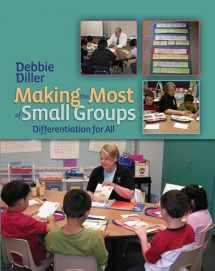
Making the Most of Small Groups
Book details
Summary
Description
In her previous books, Literacy Work Stations and Practice with Purpose, Debbie Diller showed teachers how to productively occupy the “rest of the class” while meeting with small groups. Now Debbie turns her attention to the groups themselves and the teacher's role in small-group instruction. Making the Most of Small Groups grapples with difficult questions regarding small-group instruction in elementary classrooms such as:How do I find the time? How can I be more organized?How do I form groups? How can I differentiate to meet the needs of all of my students?
Structured around the five essential reading elements—comprehension, fluency, phonemic awareness, phonics, and vocabulary—the book provides practical tips, sample lessons, lesson plans and templates, suggestions for related literacy work stations, and connections to whole-group instruction. In addition to ideas to use immediately in the classroom, Debbie provides an overview of relevant research and reflection questions for professional conversations.


We would LOVE it if you could help us and other readers by reviewing the book
Book review



